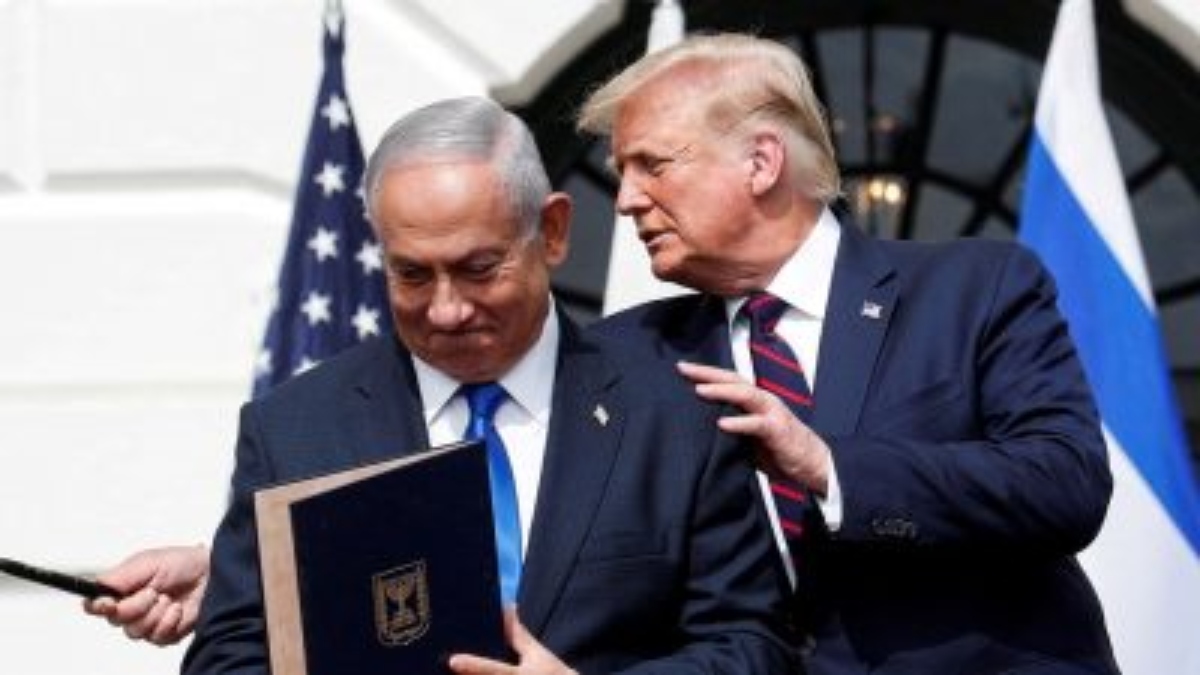In a move that’s raising eyebrows, President Donald Trump on Tuesday embarked on his first West Asia visit since being re-elected — and notably, Israel isn’t on the itinerary.
Trump concluded his Saudi Arabia trip on Wednesday and is now enroute Qatar and will wrap up the trip in United Arab Emirates, his first three-nation foreign trip of second term.
Trump’s apparent snub of Israel follows a string of decisions by the Trump administration that have either caught Israeli officials off guard or seemingly sidelined their concerns altogether.
In the run-up to his West Asia trip, President Trump has taken a series of steps that have left Israel searching for answers or perhaps, more pointedly, searching for the right questions.
Trump started talks with Iran that could allow civilian nuclear capabilities, agreed to a ceasefire with the Houthis without stopping their attacks on Israel, and, according to Reuters, dropped the demand for Saudi-Israel normalisation in exchange for a Saudi civil nuclear deal.
If that wasn’t enough, the Trump administration on Sunday bypassed Israel to strike a deal with Hamas for the release of Edan Alexander, the last known living American hostage in Gaza. Trump called it a step toward ending the war and reuniting families.
According to a CNN report, Israeli officials now worry that Trump’s week of meetings with Gulf leaders — many of whom have condemned Israel’s actions in Gaza — could signal a shift in US policy on the war and ceasefire efforts.
Impact Shorts
More ShortsNetanyahu took pride in being the first world leader to visit Trump during his second term in February. On a follow-up trip in April, he aimed to kickstart a new trade deal after Trump announced sweeping import tariffs. But he left Washington empty-handed — no deal, and a fresh concern: Trump’s surprise announcement to pursue a new nuclear agreement with Iran.
Former Israeli diplomat Alon Pinkas told CNN that Netanyahu’s influence in Washington is limited.
“There’s nothing that Netanyahu has that Trump wants, needs or (that he) can give him, as opposed to, say, the Saudis, the Qataris, (or) the Emiratis,” CNN quoted Pinkas as saying.
He said that that Gulf states are offering massive US investments and weapons deals — wins Trump can showcase domestically.
Despite years of staunch support for Trump, Netanyahu has little leverage left. Under Democratic presidents, he’s leaned on Republican allies to sway the White House. But he’s never publicly criticised Trump — and that’s unlikely to change.
“He’s got nothing right now,” Pinkas added.
As Netanyahu hardens his stance on defeating Hamas — even at the cost of delaying hostage releases — the rift between him and Trump appears deeper than ever.
However, President Trump dismissed concerns about sidelining Israel, saying strong US ties with regional countries ultimately benefit Israel.
“This is good for Israel,” Times of Israel quoted Trump telling reporters aboard Air Force One.
“Having a relationship like I have with these countries… I think it’s very good for Israel,” he says
In Saudi Arabia, President Donald Trump secured a $600 billion investment pledge from Riyadh and agreed on a $142 billion arms deal — touted as Washington’s largest-ever defence agreement.
The package includes contracts with over a dozen American defence firms in key areas such as air and missile defence, aerospace, maritime security, and military communications.
“Today we hope for investment opportunities worth $600 billion, including deals worth $300 billion that were signed during this forum,” Reuters quoted the Saudi crown prince as saying in a speech during a US-Saudi Investment Forum session held in Riyadh on the occasion of Trump’s visit.
“We will work in the coming months on the second phase to complete deals and raise it to $1 trillion,” he added.
Meanwhile, in a significant diplomatic shift, President Trump also announced that he would order the lifting of sanctions on Syria after a request from Saudi Crown Prince Mohammed bin Salman.
“I will be ordering the cessation of sanctions against Syria in order to give them a chance at greatness,” Reuters quoted Trump as saying at an investment forum in Riyadh.
“It’s their time to shine. We’re taking them all off,” Trump said, “Good luck Syria, show us something very special.”
On Wednesday, Trump met with Syria’s President Ahmed al-Sharaa in Saudi Arabia and urged him to normalise ties with longtime foe Israel.
Al-Sharaa once pledged allegiance to al Qaeda and swept to power at the head of a group that Washington has called a terrorist organisation.
Photos posted on Saudi state television showed them shaking hands in the presence of Saudi Arabia’s Crown Prince Mohammed bin Salman, also known as MbS.
Turkish President Tayyip Erdogan joined Trump and MbS virtually in the meeting, Turkey’s Anadolu News Agency reported.
Qatar, the next stop on Trump’s tour, hosts the largest US military base in West Asia — Al Udeid Air Base — which the U.S. State Department calls “indispensable” for operations in the region. Doha has also played a vital mediating role in conflicts from Gaza to Afghanistan, a strategy analysts say helps maintain its relevance in Washington’s eyes.
Trump’s relationship with Qatar during his first term was marked by turbulence. During the 2017 Gulf crisis, he accused Qatar of funding terrorism, appearing to side with Saudi Arabia and its allies. Yet, the Pentagon maintained strong ties with Doha, and Trump eventually pivoted to engagement, helping repair relations by 2021.
In contrast, Trump cultivated close ties with the UAE, deepening strategic and economic cooperation. The Abraham Accords, normalising UAE-Israel ties, were a major highlight. Trump worked closely with Crown Prince Mohammed bin Zayed, prioritising counter-Iran efforts and arms deals.
Today, the UAE is pushing a $1.4 trillion investment plan in AI, semiconductors, and energy to cement its role as a US tech and security partner — a vision it knows depends heavily on access to American technology.
With inputs from agencies


)

)
)
)
)
)
)
)
)



